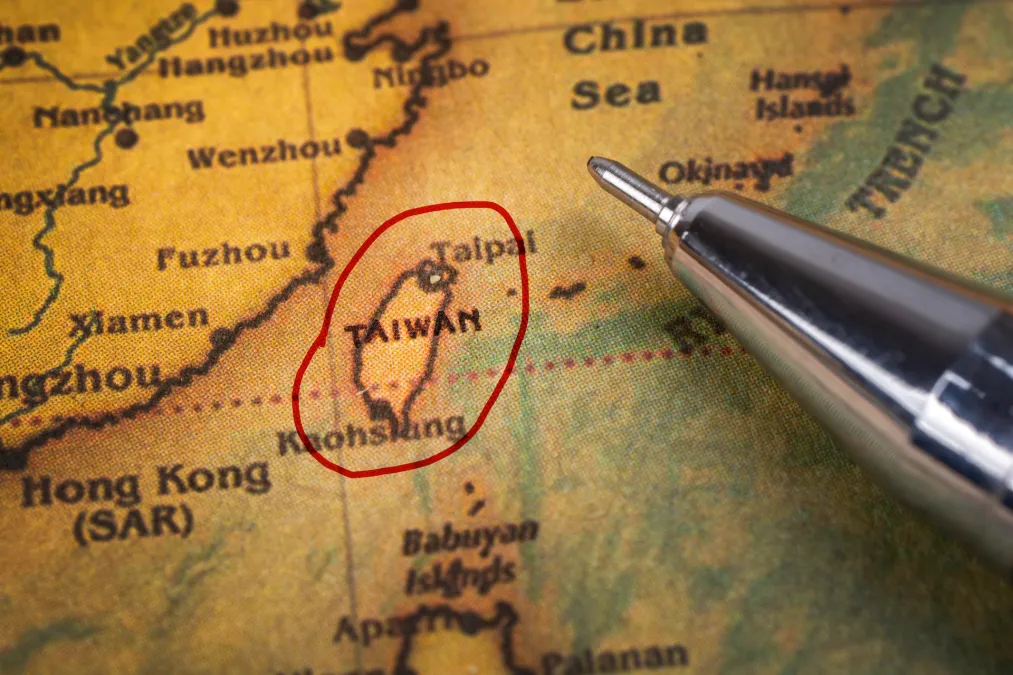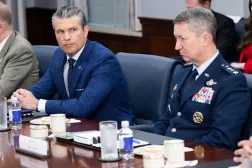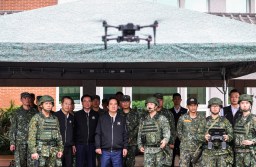Nominee for Pentagon strategist outlines approach for stymieing potential Chinese attacks on Taiwan

Austin Dahmer, President Donald Trump’s nominee for a top job at the Defense Department, outlined for lawmakers a multi-pronged approach for deterring or — if necessary — defeating a potential Chinese invasion of Taiwan.
Trump nominated Dahmer in June to be the next assistant secretary of defense for strategy, plans and capabilities, and serve as the principal advisor to Pentagon leadership on the capabilities, forces and contingency plans necessary to implement the national defense strategy, among other responsibilities.
The Trump administration subsequently rebranded the Department of Defense as the Department of War, and referred to that position as assistant secretary of war for strategy, plans and capabilities.
During his confirmation hearing Tuesday with the Senate Armed Services Committee, lawmakers revealed that the Trump administration recently rebranded the position as ASW for strategy, plans and forces.
Dahmer told lawmakers that it was his understanding that the duties and responsibilities of the position are the same as before, despite the title change that was directed via an Oct. 8 memo.
“Assistant Secretary of War for Strategy, Plans and Forces more accurately describes the position,” a Defense Department official told DefenseScoop Tuesday when asked about the recent name change.
In written responses to senators’ advance policy questions ahead of his confirmation hearing, Dahmer noted that it will take “a variety of types of forces, concepts, and posture to effectively deter and, if necessary, defeat a Chinese assault in the First Island Chain” in the Asia-Pacific region.
“The U.S. strategy of denial complements Taiwan’s plans for layered defense by providing combat-capable forces on operationally relevant timelines, to provide a strong local defense that is difficult and painful to dislodge while bolstering allied confidence in our resolve. That said, Taiwan needs to do more and faster, first and foremost by significantly increasing its defense spending and rapidly acquiring the appropriate weapons and systems needed to deter aggression from China,” he wrote.
The United States is a top arms provider for Taiwan, offering the self-governing island a variety of military capabilities — such as anti-ship missiles — that could be useful in defending against a Chinese invasion. However, some observers have expressed concerns that Taipei isn’t optimizing its weapons purchases for such a scenario or doing enough to prepare.
The Chinese government has long asserted that Taiwan is part of China and should be brought under its control. Beijing is also involved in other territorial disputes with several of its neighbors, including American allies.
“The most important thing the United States and its regional allies can do is ensure they have sufficient military forces to deter China. If we do this, then Beijing’s attempts to expand its influence and dominate its neighbors can be resisted,” Dahmer, who has recently been performing the duties of deputy undersecretary of defense for policy, told lawmakers.
The U.S. military needs to further mature and field manned submarines and underwater drones; mobile, ground-based long-range fires; bombers and other long-range air assets; “space control” tools; and other “enabling capabilities,” he wrote.
Special operations forces also offer “very unique capabilities” that can be leveraged, Dahmer noted during Tuesday’s hearing.
“And that’s true in great power competition, great power deterrence and potential conflict, as well as their enduring role in ensuring that the homeland is defended through counterterrorism, etc.,” he said, noting that SOF can be deployed to gain “unique placement and access” — including prior to the outbreak of a high-end conflict.
“If confirmed, I would be sure that special operations forces … would be integrated not only in our overall strategy, but in all the aspects of our plans and posture,” Dahmer said.
Strengthening ties with allies would also be on his agenda.
“The United States has a very important geographic position as well along the First Island Chain. I think the advances that the department has made in our force posture and presence in the Philippines is absolutely critical to our overall deterrence posture and our strategy in the Western Pacific. And I think continuing to advance that, if confirmed, with the posture angle would be a central focus for me, and also ensuring that our plans appropriately incorporate the abilities our allies and partners, especially our critical ones,” he told senators.
The threat of “simultaneity” — or the emergence of multiple crises at the same time — highlights the need for more “burden sharing” with allies and partners around the world, he suggested.
“I think this underscores really the central problem that our nation and the department and the joint force face — the scope and scale of the threats … [such as] China, Russia, Iran, North Korea, Islamic terrorists, narco-terrorists, etc. And we only have so many military and other resources with which to address them. I think the overall approach, I think, as the president and [Secretary of Defense Pete Hegseth] have enumerated, is one, obviously, to defend our own homeland above all else and to number two, deter China in the Indo-Pacific as in many ways an unprecedented threat, and to significantly increase our efforts at burden sharing with our allies and partners, precisely to address that very real threat of simultaneity,” Dahmer said.
He noted that Trump and Hegseth recently traveled to Asia, where they met with allies and partners. Trump also held talks with Chinese leader Xi Jinping.
“While we’re centrally focused on the military aspect of peace through strength at the department and ensuring that our defense strategy and our military forces are able to deter China in the Western Pacific, the president’s diplomatic efforts, to include with Xi himself, are making clear that we can have a modus vivendi with China. We can have peace for our two countries, but that’s peace through strength from the American side to ensure that American interests are always advanced,” Dahmer told lawmakers.
During an interview with CBS that aired on the “60 Minutes” program on Sunday, Trump declined to say whether he would order American military forces to defend Taiwan if China tried to invade the island.
“You’ll find out if it happens,” Trump said, according to a CBS transcript of the interview. “I can’t give away my secrets. I don’t want to be one of these guys that tells you exactly what’s gonna happen if something happens.”
The subject didn’t come up during the recent meeting with Xi, according to Trump.
“Taiwan is a very interesting case. It’s 69 miles away from China. We’re 9,500 miles away. But that doesn’t matter. He [Xi] understands what will happen. He and I have spoken about it. But it was never even brought up during a … two-and-a-half-hour meeting we had yesterday,” Trump said. “He has openly said, and his people have openly said at meetings, ‘We would never do anything while President Trump is president,’ because they know the consequences.”






